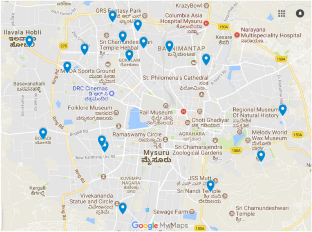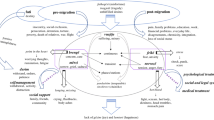Abstract
People’s lived experiences of distress are complex, personal, and vary widely across cultures. So, too, do the terms and expressions people use to describe distress. This variation presents an engaging challenge for those doing intercultural work in transcultural psychiatry, global mental health, and psychological anthropology. This article details the findings of a study of common distress terminology among 63 Kannada-speaking Hindu women living in Mysuru, the second largest city in the state of Karnataka, South India. Very little existing scholarship focuses on cultural adaptation for speakers of Dravidian languages like Kannada; this study aims to fill this gap and support greater representation of this linguistic family in research on mental health, idioms of distress, and distress terminology. Between 2018 and 2019, we conducted a 3-phase study consisting of interviews, data reduction, and focus group discussions. The goal was to produce a non-exhaustive list of common Kannada distress terms that could be used in future research and practice to translate and culturally adapt mental health symptom scales or other global mental health tools.


Similar content being viewed by others
Notes
British and American English are the two most common sources of English words in Indian languages; the former due to colonialism and its legacies, and the latter largely due to media-driven globalization.
There are many situations in which possession is a positively valued state, as in certain temple settings or during particular rituals. In these conversations, women were referring to the more negative versions of possession.
References
Abramowitz, S. A. (2010). Trauma and humanitarian translation in Liberia: The tale of open mole. Culture, Medicine, and Psychiatry, 34, 353–379.
Anukriti, S., Herrera-Almanza, C., Pathak, P. K., & Karra, M. (2020). Curse of the Mummy-Ji: the influence of mothers-in-law on women in India. American Journal of Agricultural Economics, 102(5), 1328–1351.
Atal, S., & Foster, J. (2021). “A woman’s life is tension”: A gendered analysis of women’s distress in poor urban India. Transcultural Psychiatry, 58(3), 404–413.
Bernal, G., & Adames, C. (2017). Cultural adaptations: Conceptual, ethical, contextual, and methodological issues for working with ethnocultural and majority-world populations. Prevention Science, 18(6), 681–688.
Borsa, J. C., Damásio, B. F., & Bandeira, D. R. (2012). Cross-cultural adaptation and validation of psychological instruments: Some considerations. Paidéia (ribeirão Preto), 22, 423–432.
Crowder, M. K., & Kemmelmeier, M. (2018). Cultural differences in shame and guilt as understandable reasons for suicide. Psychological Reports, 121(3), 396–429.
Cuijpers, P., Karyotaki, E., Reijnders, M., Purgato, M., & Barbui, C. (2018). Psychotherapies for depression in low-and middle-income countries: a meta-analysis. World Psychiatry, 17(1), 90–101.
Dandona, R., Kumar, G. A., Dhaliwal, R. S., Naghavi, M., Vos, T., Shukla, D. K., ... & Dandona, L. (2018). Gender differentials and state variations in suicide deaths in India: the Global Burden of Disease Study 1990–2016. The Lancet Public Health, 3(10), e478-e489.
Fricker, M. (2007). Epistemic injustice: Power and the ethics of knowing. Oxford University Press.
Halliburton, M. (2005). “Just some spirits”: The erosion of spirit possession and the rise of “tension” in South India. Medical Anthropology, 24(2), 111–144.
Inter-Agency Standing Committee. (2006). IASC guidelines on mental health and psychosocial support in emergency settings. Geneva, Switzerland: IASC 2006.
Kar, S. K., Menon, V., Arafat, S. Y., Singh, A., Das, A., Shankar, A., & Perera, S. (2021). Dhat syndrome: Systematic review of epidemiology, nosology, clinical features, and management strategies. Asian Journal of Psychiatry, 65, 102863.
Kohrt, B. A., Luitel, N. P., Acharya, P., & Jordans, M. J. (2016). Detection of depression in low resource settings: validation of the Patient Health Questionnaire (PHQ-9) and cultural concepts of distress in Nepal. BMC Psychiatry, 16, 1–14.
Kothari, R., & Snell, R. (Eds.). (2011). Chutnefying English: The phenomenon of Hinglish. Penguin Books.
Lang, C., & Jansen, E. (2013). Appropriating depression: biomedicalizing ayurvedic psychiatry in Kerala, India. Medical Anthropology, 32(1), 25–45.
Lewis-Fernández, R., & Kirmayer, L. J. (2019). Cultural concepts of distress and psychiatric disorders: Understanding symptom experience and expression in context. Transcultural Psychiatry, 56(4), 786–803.
Maitra, S., Brault, M. A., Schensul, S. L., Schensul, J. J., Nastasi, B. K., Verma, R. K., & Burleson, J. A. (2015). An approach to mental health in low-and middle-income countries: a case example from urban India. International Journal of Mental Health, 44(3), 215–230.
McKown, S., Acquadro, C., Anfray, C., Arnold, B., Eremenco, S., Giroudet, C., & Weiss, D. (2020). Good practices for the translation, cultural adaptation, and linguistic validation of clinician-reported outcome, observer-reported outcome, and performance outcome measures. Journal of Patient-Reported Outcomes, 4(1), 1–8.
Mehta, N. (2011). Mind-body dualism: A critique from a health perspective. Mens Sana Monographs, 9(1), 202.
Meili, I., & Maercker, A. (2019). Cultural perspectives on positive responses to extreme adversity: A playing field for metaphors. Transcultural Psychiatry, 56(5), 1056–1075.
Mendenhall, E. (2019). Rethinking diabetes: Entanglements with trauma, poverty, and HIV. Cornell University Press.
Nichter, M. (1981). Idioms of distress: Alternatives in the expression of psychosocial distress: A case study from South India. Culture, Medicine and Psychiatry, 5(4), 379–408.
Nichter, M. (2010). Idioms of distress revisited. Culture, Medicine, and Psychiatry, 34, 401–416.
Pereira, B., Andrew, G., Pednekar, S., Pai, R., Pelto, P., & Patel, V. (2007). The explanatory models of depression in low income countries: Listening to women in India. Journal of Affective Disorders, 102(1–3), 209–218.
Raguram, R. D. P. M., Weiss, M. G., Channabasavanna, S. M., & Devins, G. M. (1996). Stigma, depression, and somatization in South India. American Journal of Psychiatry, 153(8), 1043–1049.
Roberts, T., Shrivastava, R., Koschorke, M., Patel, V., Shidhaye, R., & Rathod, S. D. (2020). “Is there a medicine for these tensions?” Barriers to treatment-seeking for depressive symptoms in rural India: A qualitative study. Social Science & Medicine, 246, 112741.
Robitaille, M. C., & Chatterjee, I. (2017). Mothers-in-law and son preference in India. Economic and Political Weekly, 52(6), 42–50.
Snell-Rood, C. (2015). No one will let her live: Women’s struggle for well-being in a Delhi slum. University of California Press.
Snodgrass, J. G., Dengah, H. F., Polzer, E., & Else, R. (2019). Intensive online videogame involvement: A new global idiom of wellness and distress. Transcultural Psychiatry, 56(4), 748–774.
Solomon, H. (2016). Metabolic living: Food, fat, and the absorption of illness in India. Duke University Press.
Thirunavukarasu, M., & Thirunavukarasu, P. (2010). Training and national deficit of psychiatrists in India–A critical analysis. Indian Journal of Psychiatry, 52(Suppl1), S83.
Udina, M., Foulon, H., Valdés, M., Bhattacharyya, S., & Martín-Santos, R. (2013). Dhat syndrome: A systematic review. Psychosomatics, 54(3), 212–218.
Wahid, S. S., Sarker, M., Arafat, A. E., Apu, A. R., & Kohrt, B. A. (2021). Tension and other Idioms of distress among slum Dwelling young men: A qualitative study of depression in urban Bangladesh. Culture, Medicine, and Psychiatry, 46, 1–33.
Weaver, L. J. (2017). Tension among women in North India: An idiom of distress and a cultural syndrome. Culture, Medicine, and Psychiatry, 41(1), 35–55.
Weaver, L. J., & Karasz, A. (2022). “Tension” and distress in South Asia: A systematic literature review. SSM-Mental Health, 2, 100092.
Weaver, L. J., Krupp, K., & Madhivanan, P. (2022). The hair in the garland: Hair loss and social stress among women in South India. Culture, Medicine, and Psychiatry, 46(2), 456–474.
White, R. G., Fay, R., Chiumento, A., Giurgi-Oncu, C., & Phipps, A. (2022). Communication about distress and well-being: Epistemic and ethical considerations. Transcultural Psychiatry, 59(4), 413–424.
Funding
Funding was provided by University of Oregon.
Author information
Authors and Affiliations
Corresponding author
Ethics declarations
Conflict of interest
On behalf of all authors, the corresponding author states that there is no conflict of interest.
Ethical approval
All procedures performed in this study were in accordance with the ethical standards of the first author’s USA-based institutional review board, with the co-first-author’s India-based institutional ethics review board, and with the 1964 Helsinki declaration and its later amendments or comparable ethical standards. All study participants gave full informed consent prior to participation.
Additional information
Publisher's Note
Springer Nature remains neutral with regard to jurisdictional claims in published maps and institutional affiliations.
Rights and permissions
Springer Nature or its licensor (e.g. a society or other partner) holds exclusive rights to this article under a publishing agreement with the author(s) or other rightsholder(s); author self-archiving of the accepted manuscript version of this article is solely governed by the terms of such publishing agreement and applicable law.
About this article
Cite this article
Weaver, L.J., Nanjaiah, S., Begum, F. et al. A Glossary of Distress Expressions Among Kannada-Speaking Urban Hindu Women. Cult Med Psychiatry (2024). https://doi.org/10.1007/s11013-023-09843-3
Accepted:
Published:
DOI: https://doi.org/10.1007/s11013-023-09843-3




